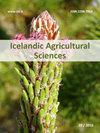Inoculation with arbuscular mycorrhizal fungi, fertilization and seed rates influence growth and development of lyme grass seedlings in two desert areas in Iceland
IF 0.2
4区 农林科学
Q4 AGRICULTURE, MULTIDISCIPLINARY
引用次数: 1
Abstract
The potential benefits of artificial inoculation with arbuscular mycorrhizal fungi (AMF) for lyme grass seedling establishment were tested in combination with varying fertilizer and seed rates in a long term revegetation study in two sandy deserts in Iceland. Fertilizer inputs proved more effective than other treatment variables in increasing vegetative growth, flowering and sand accretion of lyme grass seedlings. For this, re-fertilization was more important than the initial dose. AMF inoculation initially improved seedling growth but after the first year the effects became neutral or negative. While fertilization generally reduced AMF colonization, the negative effects of inoculation on lyme grass were enhanced by fertilization. Larger seed doses raised interand intraspecific competition, decreasing lyme grass vegetative regeneration and associate vegetation. Based on the current results, the application of AMF inoculation cannot be recommended for lyme grass establishment at the present. However, low seed rates (≤50 seeds m-2) and low initial fertilizer doses (≤10 g m-2) in combination with moderate re-fertilization application rates for a few years are apparently economical for the establishment of lyme grass for revegetation projects.接种丛枝菌根真菌、施肥和种子率对冰岛两个沙漠地区莱姆草幼苗生长发育的影响
在冰岛的两个沙地上进行了一项长期的植被恢复研究,研究了人工接种丛枝菌根真菌(AMF)对莱姆草幼苗建立的潜在效益,并结合不同的肥料和种子率进行了试验。在促进莱姆草幼苗营养生长、开花和增沙方面,施肥比其他处理更有效。为此,再受精比初始剂量更重要。接种AMF一开始对幼苗生长有促进作用,但一年后效果变为中性或负作用。虽然施肥一般会减少AMF的定殖,但接种对莱姆草的负面影响因施肥而增强。较大的种子剂量增加了种内竞争,减少了莱姆草的营养更新和伴生植被。根据目前的研究结果,目前还不能推荐接种AMF用于莱姆草的建立。然而,低种子率(≤50粒m-2)和低初始施肥剂量(≤10克m-2)结合几年适度的再施肥施用,对莱姆草恢复项目的建立显然是经济的。
本文章由计算机程序翻译,如有差异,请以英文原文为准。
求助全文
约1分钟内获得全文
求助全文
来源期刊

Icelandic Agricultural Sciences
AGRICULTURE, MULTIDISCIPLINARY-
CiteScore
0.80
自引率
0.00%
发文量
0
审稿时长
>12 weeks
期刊介绍:
Icelandic Agricultural Sciences is published annually, or more frequently. The deadline for submitting manuscripts that are intended to appear within that year is September. The journal is in English and is refereed and distributed internationally. It publishes original articles and reviews written by researchers throughout the world on any aspect of applied life sciences that are relevant under boreal, alpine, arctic or subarctic conditions. Relevant subjects include e.g. any kind of environmental research, farming, breeding and diseases of plants and animals, hunting and fisheries, food science, forestry, soil conservation, ecology of managed and natural ecosystems, geothermal ecology, etc.
 求助内容:
求助内容: 应助结果提醒方式:
应助结果提醒方式:


